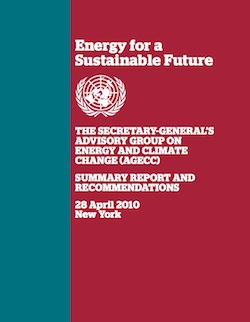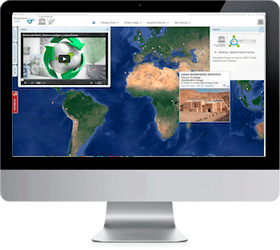AGECC calls on the United Nations system and its Member States to commit themselves to two complementary goals:
 1. Ensure universal access to modern energy services by 2030. The global community should aim to provide access for the 2-3 billion people excluded from modern energy services, to a basic minimum threshold of modern energy services for both consumption and productive uses.Access to these modern energy services must be reliable and affordable, sustainable and, where feasible, from low-GHG-emitting energy sources. The aim of providing universal access should be to create improved conditions for economic take-off, contribute to attaining the MDGs, and enable the poorest of the poor to escape poverty. All countries have a role to play: the high-income countries can contribute by making this goal a development assistance priority and catalyzing financing; the middle-income countries can contribute by sharing relevant expertise, experience and replicable good practices; and the low-income countries can help create the right local institutional, regulatory and policy environment for investments to be made, including by the private sector.
1. Ensure universal access to modern energy services by 2030. The global community should aim to provide access for the 2-3 billion people excluded from modern energy services, to a basic minimum threshold of modern energy services for both consumption and productive uses.Access to these modern energy services must be reliable and affordable, sustainable and, where feasible, from low-GHG-emitting energy sources. The aim of providing universal access should be to create improved conditions for economic take-off, contribute to attaining the MDGs, and enable the poorest of the poor to escape poverty. All countries have a role to play: the high-income countries can contribute by making this goal a development assistance priority and catalyzing financing; the middle-income countries can contribute by sharing relevant expertise, experience and replicable good practices; and the low-income countries can help create the right local institutional, regulatory and policy environment for investments to be made, including by the private sector.
2. Reduce global energy intensity by 40 per cent by 2030. Developed and developing countries alike need to build and strengthen their capacity to implement effective policies, market based mechanisms, business models, investment tools and regulations with regard to energy use. Achieving this goal will require the international community to harmonize technical standards for key energy-consuming products and equipment, to accelerate the transfer of know-how and good practices, and to catalyze increased private capital flows into investments in energy efficiency.
The successful adoption of these measures would reduce global energy intensity by about 2.5 per cent per year – approximately double the historic rate. Delivering these two goals is key to achieving the Millennium Development Goals, improving the quality and sustainability of macroeconomic growth, and helping to reduce carbon emissions over the next 20 years.
![]() Energy for a sustainable future | PDF
Energy for a sustainable future | PDF















